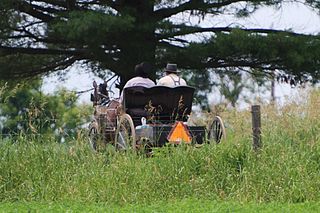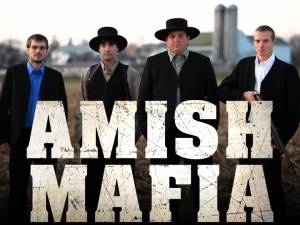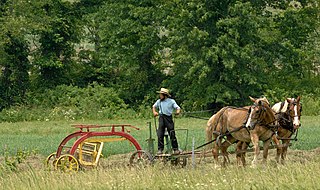Related Research Articles

Plain people are Christian groups characterized by separation from the world and by simple living, including plain dressing in modest clothing. Many Plain people have an Anabaptist background. These denominations are largely of German, Swiss German, Dutch or other European ancestry. Conservative Friends are traditional Quakers who are also considered plain people; they come from a variety of different ethnic backgrounds.
Rumspringa, also spelled Rumschpringe or Rumshpringa, is a rite of passage during adolescence, translated in English as "jumping or hopping around", used in some Amish communities. The Amish, a subsect of the Anabaptist Christian movement, intentionally segregate themselves from other communities as a part of their faith. For Amish youth, the Rumspringa normally begins around the ages of 14–16 and ends when a youth chooses either to be baptized in the Amish church or to leave the community. For Wenger Mennonites, Rumspringa occurs between ages of 17 and 21.
Amish in the City is an American reality television series which premiered on UPN on July 28, 2004. The plot revolved around five Amish teenagers experiencing "modern" (non-Amish) culture by living in a house with six mainstream American teenagers.
Moses M Beachy was the founding bishop of the Beachy Amish Mennonite churches in 1927 and a former bishop in the Old Order Amish churches.
Weavertown Amish Mennonite Church is a Beachy Amish Mennonite congregation located in the village of Weavertown, between the somewhat larger villages of Bird-in-Hand and Intercourse in Lancaster County, Pennsylvania, United States.
Amish Mennonites came into existence through reform movements among North American Amish mainly between 1862 and 1878. These Amish moved away from the old Amish traditions and drew near to the Mennonites, becoming Mennonites of Amish origin. Over the decades, most Amish Mennonites groups removed the word "Amish" from the name of their congregations or merged with Mennonite groups.

Pinecraft is a small neighborhood community of Amish and Mennonites. It is situated near the intersection of Bahia Vista Street and Beneva Road in Sarasota, Florida, U.S. It is a popular winter vacation spot for many North American Amish and Mennonites, particularly from Indiana, Ohio and Pennsylvania.
The Mennonite Christian Fellowship churches, or just Fellowship churches, are an Amish Mennonite constituency within the conservative Anabaptist faith and tradition. The group is theologically and historically similar to the Beachy Amish Mennonite constituency. They are somewhat closer in thought to the Conservative Mennonites in matters of doctrine and conservatism.

The Beachy Amish Mennonites are an Anabaptist group of churches with Amish roots. Although they have retained the name "Amish" they are quite different from the common idea of Amish: they do not use horse and buggy for transportation, with a few exceptions they do not speak Pennsylvania German anymore, nor do they have restrictions on technology except for radio and television. In the years 1946 to 1977 a majority was transformed into an evangelical revivalist denomination. The traditionalists who wanted to preserve the old Beachy Amish ways then withdrew and formed their own congregations. Today they are known as Midwest Beachy Amish Mennonites or Old Beachy Amish.

The Amish are a group of traditionalist Christian church fellowships with Swiss German and Alsatian Anabaptist origins. They are closely related to Mennonite churches. The Amish are known for simple living, plain dress, Christian pacifism, and slowness to adopt many conveniences of modern technology, with a view neither to interrupt family time, nor replace face-to-face conversations whenever possible, and a view to maintain self-sufficiency. The Amish value rural life, manual labor, humility, and Gelassenheit, all under the auspices of living what they interpret to be God's word.
Kingdom of Simplicity is a novel by American author Holly Payne published in June 2009. It is Payne's third novel.
The Swartzentruber Amish are the best-known and one of the largest and most conservative subgroups of Old Order Amish. Swartzentruber Amish are considered a subgroup of the Old Order Amish, although they do not fellowship or intermarry with more liberal Old Order Amish. They speak Pennsylvania German as their mother tongue as well as English.

Amish believe large families are a blessing from God. Amish rules allow marrying only between members of the Amish Church. The elderly do not go to a retirement facility; they remain at home. As time has passed, the Amish have felt pressures from the modern world; their traditional rural way of life is becoming more different from the modern society. Isolated groups of Amish populations may have genetic disorders or other problems of closed communities. Amish make decisions about health, education, relationships based on their Biblical interpretation. Amish life has influenced some things in popular culture.
Subgroups of Amish developed over the years, as Amish churches have divided many times over doctrinal disputes. The 'Old Order' Amish, a conservative faction that withdrew from fellowship with the wider body of Amish in the 1860s, are those that have most emphasized traditional practices and beliefs. There are many different subgroups of Amish with most belonging, in ascending order of conservatism, to the Beachy Amish, New Order, Old Order, or Swartzentruber Amish groups.

Breaking Amish is an American reality television series on the TLC television network that debuted September 9, 2012. The series revolves around five young Anabaptist adults who move to New York City in order to experience a different life and decide whether to return to their communities or remain outside them and face ostracism by their families and friends. It follows the cast members as they experience life in New York and face new situations involving work, friendship, romance, and lifestyle, plus the drama that develops among cast members as they undergo various experiences.

Amish Mafia is an American reality television series that debuted on December 12, 2012, on the Discovery Channel. The series follows "Lebanon Levi", along with three of his assistants, who are purported to be a "mafia" in an Amish community. Although portrayed by Discovery Channel as documentary "reality" television, the authenticity of the series has been refuted by scholars, local newspapers, and law enforcement. The supposed secret organization within the Amish is known to be an entirely fictional creation for entertainment purposes only. There have also been accusations of the series being bigoted toward and defaming the Amish people.

The Renno Amish, also called Beachy Amish or "black toppers" are a subgroup of Amish that was formed in 1863 in Mifflin County, Pennsylvania. They are the moderately conservative Old Order Amish group in Kishacoquillas Valley, locally called Big Valley, but still relatively conservative compared with the Amish of other regions.
The Old Beachy Amish or Old Beachy Amish Mennonites, also called Midwest Beachy Amish Mennonites, are a Plain, car-driving Beachy Amish group, that preserves the old ways of the Beachy Amish including the German language. They live in Kentucky and Illinois. They are part of the Amish Mennonite movement in a broader sense, but they are not an organized denomination.
Anabaptists and Jews have had interactions for several centuries, since the origins of Anabaptism in the Radical Reformation in early modern Europe. Due to the insularity of many Anabaptist and Jewish communities, Anabaptist–Jewish relations have historically been limited but there are notable examples of interactions between Anabaptists and Jews. Due to some similarities in dress, culture, and language, Amish and Mennonite communities in particular have often been compared and contrasted to Hasidic Jewish communities.
References
- ↑ "Lifetime Movie Network's "Amish Grace" Breaks Records With 4.02 Million Viewers". tvbythenumbers.zap2it.com/. 2010-03-29. Archived from the original on 2013-12-14. Retrieved January 9, 2013.
- ↑ "Little red schoolhouse", Wikimapia .
- ↑ Wojtasik, Ted (October 1, 1996). No Strange Fire: A Novel about the Amish Barn Fires in Big Valley. Herald Press. pp. 402. ISBN 978-0836190410.
- ↑ Beachy, Stephen. "Zeke Yoder vs. The Singularity: An Amish Sci-fi Novel". kickstarter.com. Retrieved 8 April 2018.
- ↑ Fisher, Jim, Crimson Stain, Berkley Books, 2000
- ↑ "American Experience: The Amish". PBS. February 27, 2012. Retrieved October 18, 2012.
- 1 2 3 4 Igou, Brad. "The Amish in the Media". Amish County News. Archived from the original on 2012-01-12. Retrieved 2007-05-10.
- ↑ "#23: The Outsiders". The MacGyver Project. 2015-03-08.
- ↑ Eng, Joyce (March 11, 2010). "Football Hall of Famer and Actor Merlin Olsen Dies at 69". TV Guide. Retrieved September 11, 2012.
- ↑ "The Dirty Work for the Clan". New York Times (online ed.). US. 11 December 2012. Retrieved 21 December 2012.
- ↑ "Discovery Channel's Next Reality Series Amish Mafia". Lancaster Online (online ed.). US: Lancaster Online. 14 November 2012. Archived from the original on 28 March 2013. Retrieved 21 December 2012.
- ↑ "Trouble in Amish Paradise". BBC TV. February 2009. Retrieved February 4, 2012.
- ↑ Deacon, Michael (March 16, 2011). "Leaving Amish Paradise". The Telegraph. Telegraph Media Group. Retrieved August 4, 2012.
- ↑ Anon (2010). "Amish: World's Squarest Teenagers". Channel 4 TV listings. Channel 4. Retrieved August 3, 2012.
- ↑ Brooker, Charlie (July 24, 2010). "Charlie Brooker's Screen burn: Amish: The World's Squarest Teenagers". The Guardian. Guardian News and Media. Retrieved August 3, 2012.
- ↑ "Living with the Amish". TV listings. Channel 4. Retrieved August 3, 2012.
- ↑ Ferguson, Euan (November 27, 2011). "Rewind TV: Living With the Amish; When Bankers Were Good; The Cafe; The Young Apprentice" (review). Observer TV reviews. Guardian News and Media. Retrieved August 3, 2012.
- ↑ Andreeva, Nellie (August 11, 2011). "Cinemax Prepping Amish Country Series Executive Produced by Alan Ball". Deadline. Retrieved August 2, 2012.
- ↑ "Vanilla Ice Goes Amish : Vanilla Ice : DIY Network" . Retrieved October 24, 2014.
- ↑ Chislett, Anne. "Quiet in the Land". Dramatists Play Service. Retrieved 2012-10-13.